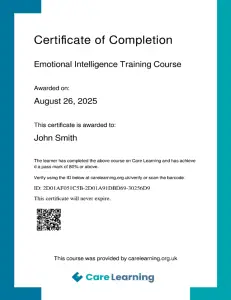Psychology is the study of the human mind and behaviour, exploring how people think, feel, and act in different situations. It provides valuable insights into learning, relationships, mental health, and the way we interact with the world around us.
This free training course offers a structured introduction to psychology, covering its history, research methods, major branches, and real-world applications. Learners will explore how psychology informs health and social care practice, education, and everyday life.
Why Take This eLearning Course?
Psychology is not just about theory—it has practical applications that can improve communication, support wellbeing, and enhance professional practice. For care professionals, educators, and learners, psychology provides a foundation for understanding people and promoting positive outcomes.
Here’s why this course is right for you:
- Comprehensive introduction: Explore the historical roots of psychology and its development as a modern science.
- Practical knowledge: Understand how psychology applies in care, education, and professional contexts.
- Research-informed: Learn how psychologists use evidence-based methods to study behaviour and guide practice.
- Wide coverage: Study cognitive, social, developmental, abnormal, and biological psychology, along with specialist subfields.
- Workplace relevance: Apply psychological insights to support people more effectively and work confidently with others.
Learning Outcomes
By the end of this course, you will be able to:
- Define psychology and explain its historical approaches.
- Identify the major branches of psychology and their focus areas.
- Understand common research methods, ethical principles, and evidence-based practice.
- Describe memory, attention, perception, and cognitive biases.
- Explain social influences such as stereotypes, conformity, and group dynamics.
- Recognise the stages of human development and theories of attachment and language.
- Identify common psychological disorders and treatment approaches.
- Explain how biology, genetics, and the environment shape behaviour.
- Understand the role of psychology in professional practice across multiple subfields.
Course Content
This course is divided into eight structured modules:
1. Foundations of Psychology
Learn what psychology is, how it developed historically, and the main branches of study. This module explores early approaches such as behaviourism and psychoanalysis, alongside modern perspectives. You’ll also examine how psychology is used in everyday life and in health and social care.
2. Research Methods in Psychology
Understand how psychologists conduct research, including experiments, case studies, and surveys. Learn about hypothesis testing, data analysis, and the importance of ethical practice. This module also introduces evidence-based practice and its role in professional decision-making.
3. Cognitive Psychology
Explore how memory, attention, and perception work, and how they influence behaviour. Learn about short-term and long-term memory, cognitive biases that shape decision-making, and the role of neuropsychology in understanding brain–behaviour relationships.
4. Social Psychology
Discover how people interact, think, and influence each other. This module covers stereotypes, conformity, obedience, pro-social and anti-social behaviour, and the bystander effect. You’ll see how these ideas apply to care work, teamwork, and safeguarding.
5. Developmental Psychology
Examine human growth and development across the lifespan. Explore theories of attachment, language acquisition, and social development, and consider their importance in health, social care, and education.
6. Mental Health and Abnormal Psychology
Learn about the classification of psychological disorders and the features of conditions such as anxiety, depression, and phobias. Explore coping strategies, therapy approaches, and the shift from historical treatments to modern evidence-based care.
7. Biological Psychology
Understand how biology influences behaviour, including the brain and nervous system, neurotransmitters, hormones, and genetics. Consider how biology interacts with environment to shape personality, behaviour, and mental health.
8. Exploring Subfields of Psychology
Gain an overview of applied psychology in different professions, including clinical, forensic, occupational, and educational psychology. See how psychology is used to improve outcomes across healthcare, education, and workplace settings.
Target Audience
This course is suitable for:
- Health and social care workers who want to understand behaviour and mental health more deeply.
- Carers and support workers who wish to apply psychology in daily practice.
- Students and learners preparing for careers in care, psychology, or education.
- Teachers and youth workers looking to support learning and development.
- Anyone with an interest in psychology and its applications in everyday life.
The course is beginner-friendly, requiring no prior study of psychology. However, it also provides depth for professionals seeking to refresh or expand their knowledge.
FAQ
What does the course cover?
The course introduces psychology as a discipline, covering its history, research methods, major branches, abnormal psychology, and applied subfields.
Can I apply what I learn immediately?
Yes. Psychology has everyday applications—from communication and teamwork to supporting individuals with care needs.
How long will it take?
This self-paced course typically takes 1 hour to complete.
Will I receive a certificate?
Yes. A certificate of completion is provided to evidence your learning.
Is this course relevant to UK practice?
Absolutely. The course content is aligned to UK health and social care contexts and education frameworks.
Is this course CPD accredited?
Not yet, but CPD accreditation is currently being developed.
Psychology provides a foundation for understanding human thought and behaviour. By studying this course, you’ll gain valuable knowledge and practical skills that will benefit your professional role, your personal development, and your understanding of others.
Join today and begin your journey into psychology with this comprehensive training course.
You must log in and have started this course to submit a review.
Psychology in Health and Social Care Training Course CPD Accredited and Government Funding
We’re working on getting this Psychology in Health and Social Care Training Course CPD accredited, and any course that’s approved will be clearly labelled as CPD accredited on the site. Not every health and social care course has to be accredited to help you meet CQC expectations – what matters is that staff are competent, confident and properly trained for their roles under Regulation 18. Our courses are built to support those requirements, and because they’re not government funded there are no eligibility checks or ID needed – you can enrol and start learning straight away.



